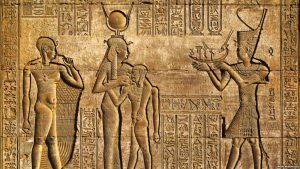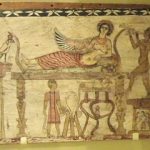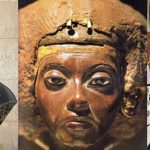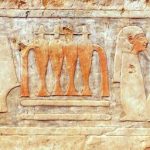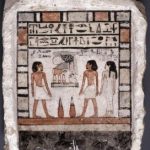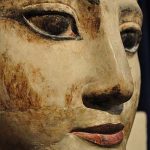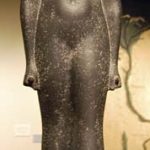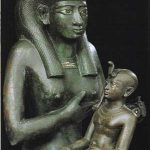Cleopatra VII (69-30 BCE) had the misfortune to ascend the throne at a time when Egypt’s wealth and military power were in decline and an aggressive and assertive Roman Empire was expanding. The legendary queen also suffered from history’s tendency to define powerful female rulers by the men in their lives.
Cleopatra VII was Egypt’s final ruler in its long history prior to being annexed by Rome as an African province.
Cleopatra is undoubtedly famous for her tumultuous affair and then marriage to Mark Antony (83-30 BCE), a Roman general and statesman. Cleopatra also conducted a previous relationship with Julius Caesar (c.100-44 BCE).
Cleopatra VII’s entanglement with Mark Antony propelled her into an inevitable clash with the ambitious Octavian Caesar known later as Augustus Caesar, (r. 27 BCE-14 CE).
Facts About Cleopatra VII
- Cleopatra VII the last Ptolemaic pharaoh of Egypt
- Officially Cleopatra VII ruled with a co-regent
- She was born in 69 BC and with her death on August 12, 30 BC, Egypt became a province of the Roman Empire
- Cleopatra VII’s son with Julius Caesar, Cesarion was murdered before he could succeed her on Egypt’s throne
- The Ptolemaic pharaohs were of Greek descent rather than Egyptian and ruled Egypt for more than three hundred years
- Fluent in several languages, Cleopatra used her notable charm to become the most effective and powerful of Egypt’s later Ptolemaic pharaohs before her encounters with Rome
- Cleopatra VII was overthrown by Pothinus her chief advisor together with Theodotus of Chios, and her General Achillas in 48 BCE before being restored to her throne by Julius Caesar
- Through her relationships with Caesar and later Mark Antony Cleopatra VII secured the Roman Empire as a temporary ally during a turbulent time
- Cleopatra VII’s rule ended after Mark Antony and Egyptian forces were defeated in 31 BCE at the Battle of Actium by Octavian. Mark Antony committed suicide and Cleopatra ended her life by snakebite rather than be paraded through Rome in chains as Octavian’s prisoner.
Cleopatra VII’s Family Lineage
While Cleopatra VII was arguably Egypt’s most famous queen, Cleopatra herself was a descendant of the Greek Ptolemaic Dynasty (323-30 BCE), which ruled Egypt following Alexander the Great’s death (c. 356-323 BCE).
Alexander the Great was a Greek general from the Macedonian region. He died in June of 323 BCE. His vast conquests were divided amongst his generals. One of Alexander’s Macedonian generals Soter (r. 323-282 BCE), took Egypt’s throne as Ptolemy I founding ancient Egypt’s Ptolemaic Dynasty. This Ptolemaic line, with its Macedonian-Greek ethnic heritage, ruled Egypt for nearly three hundred years.
Born in 69 BCE Cleopatra VII Philopator initially ruled in tandem with her father, Ptolemy XII Auletes. Cleopatra’s father died when she was eighteen, leaving her alone on the throne. As Egyptian tradition demanded a male partner on the throne beside a woman, Cleopatra’s brother, the then twelve-years-old Ptolemy XIII was married to her with much ceremony as her co-ruler in keeping with the wishes of their father. Cleopatra soon deleted all references to him from government documents and ruled absolutely in her own right.
The Ptolemys basked in their Macedonian-Greek lineage and reigned in Egypt for nearly three hundred years without deigning to learn the Egyptian language or fully embracing its customs. Alexander the Great had founded the port of Alexandria on the shore of the Mediterranean Sea as Egypt’s new capital in 331 BCE. The Ptolemys cordoned themselves off in Alexandria, which was effectively a Greek city as its language and customers were Greek rather than Egyptians. There were no marriages with outsiders or native Egyptians, brother married sister or uncle married niece to maintain the integrity of the royal lineage.
Cleopatra, however, demonstrated her facility in languages from an early age, being charmingly fluent in Egyptian and her native Greek and proficient in several other languages. Thanks to her language skills, Cleopatra was able to communicate readily with visiting diplomats without resorting to a translator. Cleopatra appears to have continued her self-sufficient style after her father’s death and rarely consulted on matters of state with her council of advisors.
Cleopatra’s proclivity of arriving at decisions on her own and acting on her own initiative without seeking the advice of senior members of her court appears to have affronted some of her high-ranking officials. This resulted in her overthrow by Pothinus her chief advisor together with Theodotus of Chios, and her General Achillas in 48 BCE. The plotters installed her brother Ptolemy XIII in her place, in the belief, he would be more open to their influence than Cleopatra. Subsequently, Cleopatra and Arsinoe her half-sister fled to safety in Thebaid.

Pompey, Caesar And The Collision With Rome
Around this time Julius Caesar defeated Pompey the Great, a distinguished Roman politician and general at the Battle of Pharsalus. Pompey had spent considerable time in Egypt during his military campaigns and was the younger Ptolemy children’s guardian.
Thinking his friends would welcome him Pompey escaped Pharsalus and travelled to Egypt. Caesar’s army had been smaller than Pompey’s and it was thought Caesar’s stunning victory indicated the gods favoured Caesar over Pompey. Ptolemy XIII’s advisor Pothinus convinced the young Ptolemy XIII to align himself with the future ruler of Rome rather than its past. So, rather than finding sanctuary in Egypt, Pompey was murdered as he came on shore at Alexandria under the watchful eye of Ptolemy XIII.
Upon the arrival of Caesar and his legions in Egypt, contemporary accounts recount Caesar being outraged by Pompey’s murder. Declaring martial law, Caesar established his headquarters in the royal palace. Ptolemy XIII and his court subsequently fled to Pelusium. Caesar, however, had him promptly returned to Alexandria.
Remaining in exile Cleopatra understood she needed a new strategy to come to an accommodation with Caesar and his legions in Alexandria. Recognizing her return to power lay through Caesar, legend has it that Cleopatra was rolled in a rug and transported through enemy lines. Upon reaching the royal palace, the rug was duly presented to Caesar ostensibly as a gift for the Roman general. She and Caesar appeared to spark an immediate rapport. When Ptolemy XIII arrived at the palace the following morning for his audience with Caesar, Cleopatra and Caesar had already become lovers, much to the chagrin of Ptolemy XIII.
Cleopatra’s Relationship With Julius Caesar
Confronted by Cleopatra’s new alliance with Caesar, Ptolemy XIII made a grave error. Supported by Achillas his general Ptolemy XIII opted to press his claim to the Egyptian throne by force of arms. War erupted between Caesar’s legions and the Egyptian army in Alexandria. Arsinoe Cleopatra’s half-sister, who had returned with her, fled the palace in Alexandria for Achillas’ camp. There she had herself proclaimed queen, usurping Cleopatra. Ptolemy XIII’s army besieged Caesar and Cleopatra in the royal palace complex for six long months until Roman reinforcements finally arrived and broke through the Egyptian army.
Ptolemy XIII attempted to escape in the aftermath of the battle only to drown in the Nile. The other coup leaders against Cleopatra either died in the battle or during its aftermath. Cleopatra’s sister Arsinoe was captured and dispatched to Rome. Caesar spared her life and exiled her to Ephesus to live out her days in the Temple of Artemis. In 41 BCE Mark Antony ordered her to be executed at Cleopatra’s urging.
After their victory over Ptolemy XIII, Cleopatra and Caesar embarked on a triumphant tour of Egypt, cementing Cleopatra’s reign as Egypt’s Pharaoh. In June of 47 BCE Cleopatra bore Caesar a son, Ptolemy Caesar, later Caesarion and anointed him as her heir and Caesar allowed Cleopatra to rule Egypt.
Caesar embarked for Rome in 46 BCE and brought Cleopatra, Caesarion and her entourage to live with him. Caesar formally acknowledged Caesarion as his son and Cleopatra as his consort. As Caesar was married to Calpurnia and the Romans enforced strict laws prohibiting bigamy, many Senators and members of the public were unhappy with Caesar’s domestic arrangements.
Cleopatra’s Relationship With Mark Antony
In 44 BCE Caesar was assassinated. Fearing for their lives, Cleopatra escaped Rome with Caesarion and embarked for Alexandria. Caesar’s ally, Mark Antony, joined his old friend Lepidus and grandnephew Octavian in pursuing and finally defeating the last of the conspirators in Caesar’s murder. Following the Battle of Phillipi, where Antony and Octavian’s forces defeated Brutus and Cassius’ armies, the Roman Empire was divided between Antony and Octavian. Octavian held Rome’s western provinces while Antony was appointed as ruler over Rome’s eastern provinces, which included Egypt.
Antony summoned Cleopatra to appear before him in Tarsus in 41 BCE to respond to charges she had aided Cassius and Brutus. Cleopatra delayed complying with Antony’s summons and then delayed her arrival. These actions affirmed her status as Queen of Egypt and demonstrated she would arrive in her own time and at her own choosing.
Despite Egypt being on the verge of economic collapse, Cleopatra appeared wrapped in her regalia as head of a sovereign state. Cleopatra came before Antony dressed as Aphrodite in all her luxurious finery on her royal barge.
Plutarch provides us with an account of their meeting. Cleopatra sailed up the Cydnus River in her royal barge. The barge’s stern was adorned with gold while its sails were said to have been dyed purple, a colour denoting royalty and extremely expensive to acquire. Silver oars propelled the barge in time to a rhythm provided by fifes, harps and flutes. Cleopatra lay languidly under a canopy of cloth of gold dressed as Venus attended beautiful young boys, painted Cupids who fanned her continuously. Her maids were dressed as Graces and Sea Nymphs, some steering the rudder, some working the barge’s ropes. Delicate perfumes wafted across to the crowd waiting on either bank. Word quickly spread of the imminent arrival of Venus to feast with the Roman Bacchus.
Mark Antony and Cleopatra immediately became lovers and remained together for the next decade. Cleopatra would bear Mark Antony three children, For his part Antony apparently considered Cleopatra to be his wife, even though he was legally married, initially to Fulvia who was followed by Octavia, Octavian’s sister. Antony divorced Octavia and married Cleopatra.
Roman Civil War And Cleopatra’s Tragic Death
Over the years, Antony’s relations with Octavian steadily deteriorated until finally, civil war erupted. Octavian’s army decisively defeated Cleopatra and Antony’s forces in 31 BCE at the Battle of Actium. One year later, both had committed suicide. Antony stabbed himself and subsequently died in Cleopatra’s arms.
Octavian then laid out his terms to Cleopatra in an audience. The consequences of defeat became clear. Cleopatra was to be brought to Rome as a captive to grace Octavian’s triumphant procession through Rome.
Understanding Octavian was a formidable opponent, Cleopatra asked for time to prepare for this trip. Cleopatra then committed suicide through snakebite. Traditionally accounts claim Cleopatra chose an asp, although contemporary scholars believe it was more likely to have been an Egyptian cobra.
Octavian had Cleopatra’s son Caesarion murdered and brought her surviving children to Rome where his sister Octavia raised them. This brought an end to Ptolemaic dynastic rule in Egypt.
Beauty Or Intelligence And Charm
While contemporary accounts of Cleopatra portray the queen as a fabulous beauty, the records, which have come down to us left by ancient writers consistently extol Cleopatra’s charm and quick intelligence rather than her physical aspects.
Writers such as Plutarch recount how her beauty was not breathtakingly captivating. However, her personal fascinated the powerful and the humble citizen alike. Cleopatra’s charm proved irresistible on numerous occasions as both Caesar and Antony could attest and Cleopatra’s conversation brought to life her vibrant force of character. Hence it was her intelligence and manners rather than her looks that captivated others and brought them under her spell.
A Queen Unable to Reverse Egypt’s Historical Decline
Scholars have pointed out Cleopatra VII left little positive contribution behind to ancient Egypt’s economic, military, political or social systems. Ancient Egypt was undergoing a long period of gradual decline. The Ptolemaic aristocracy, together with the royal members of ancient Egyptian society was heavily influenced by the pervading Greek culture imported during Alexander the Great’s conquest of the country.
However, these final echoes of Greek and Macedonian influence no longer bestrode the Ancient World. In its place, the Roman Empire had emerged as its dominant force both militarily and economically. Not only had the Romans conquered Ancient Greece they had swept much of the Middle East and Northern Africa under their control by the time Cleopatra VII was crowned Queen of Egypt. Cleopatra VII fully realised the future of ancient Egypt as an independent country depended upon how she navigated Egypt’s relationship with Rome.

Legacy
Cleopatra had the misfortune to govern Egypt during a period of tumult and strife. Her romantic entanglements have long overshadowed her accomplishments as Egypt’s last pharaoh. Her two epic romances forged an exotic aura whose allure still continues to cast its spell even today. Over the centuries following her death, Cleopatra remains ancient Egypt’s most famous queen. Movies, television shows, books, plays and websites have explored Cleopatra’s life and she has been the subject of works of art in succeeding centuries up to and including the present day. While Cleopatra’s origins may have been Macedonian-Greek, rather than Egyptian, Cleopatra has come to epitomize the sumptuousness of ancient Egypt in our imagination far more than any previous Egyptian pharaoh save perhaps the enigmatic King Tutankhamun.
Reflecting On The Past
Were Cleopatra’s downfall and eventual suicide the result of calamitous misjudgments in her personal relationships or did the rise of Rome inevitably doom both her and Egypt’s independence?


